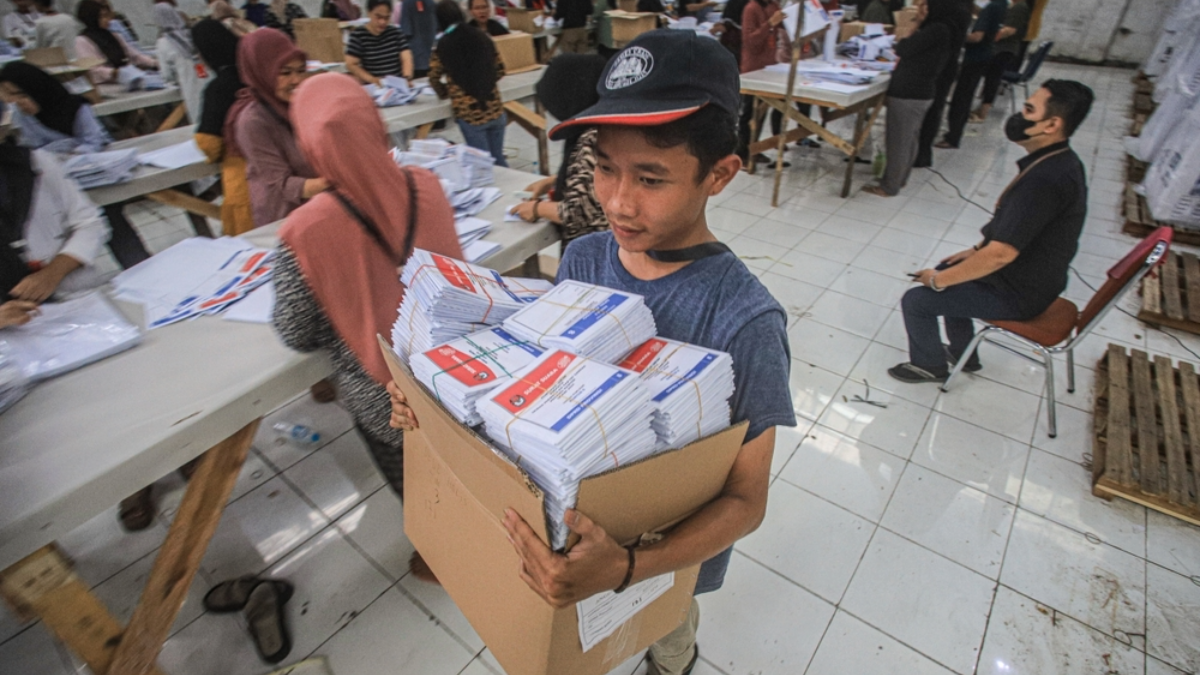The Urgency of Social Media Data Access for Electoral Integrity
Rachelle Faust, Daniel Arnaudo / Mar 4, 2024
JAKARTA, INDONESIA-A number of freelance daily workers in Jakarta fold ballot papers for the 2024 national election. Shutterstock
Access to social media data is critical for academic and civil society researchers seeking to identify and mitigate disinformation and the threat it poses to political candidates, democratic institutions, and average citizens during elections. Until recently, the data leveraged by researchers to study the impact of online violence on the political expression of women or to track authoritarian political campaigns has been provided voluntarily by the companies that own and operate social media platforms. Over the past year, however, there’s been a marked shift in several of these companies’ data-sharing practices.
This shift could not come at a worse time. As more than fifty countries prepare for elections in 2024, one needn’t look far for examples of the havoc disinformation spread on social media might cause. Just last year in Brazil, the failure of social media platforms to police disinformation during the 2022 presidential elections culminated in an attack on government buildings mobilized by online influencers who rejected the election’s result.
In perhaps the most notable reversal of free, equitable access to social media data, X imposed exorbitant subscription fees for access to its application programming interface (API) and filed a lawsuit against the Center for Countering Digital Hate, an organization that had been critical of the platform, for allegedly misusing data it had accessed through the API. Reddit also announced last year plans to charge developers for access to its previously free API, prompting dozens of major subreddits to temporarily shut down in protest.
The Digital Services Act: Better Late Than Never
This apparent circling of the wagons within the tech industry comes at an interesting time, as it coincides with the implementation of the European Union’s Digital Services Act (DSA). Article 40 of the DSA will require very large online platforms and search engines to provide access to data for vetted researchers—whether they were previously doing so voluntarily or not. The European Commission is preparing a delegated act to be implemented this spring that will prescribe the technical conditions and procedural requirements to facilitate this access while maintaining user privacy.
Some social media companies have quietly implemented policy changes in apparent anticipation of the delegated act on data access. Amid persistent rumors that its social monitoring platform CrowdTangle could be shut down, Meta introduced a new Content Library and API that provides “comprehensive access” to public data from Facebook and Instagram. Access to the tools will be managed through an application process overseen by the Inter-university Consortium for Political and Social Research at the University of Michigan, providing a layer of separation that may end up being required for all platforms under the delegated act. Other, more subtle changes include LinkedIn’s provision of a Researcher Access Program to meet its legal requirements under the DSA, and a narrow update to X’s developer terms allowing API access for researchers “only to the extent necessary for X to comply with its obligations under the DSA.”
Though the DSA presents reasons for optimism amid a period of widespread retrenchment by the tech industry, not only on the voluntary provision of data to researchers but on investments in its transparency and civic integrity initiatives more broadly, the regulation has its limitations. During such a pivotal election year, researchers need access to social media data now, and the delegated act has not yet been implemented. Even once it has been implemented, there may be a significant lag in researchers’ ability to access data from social media platforms as the companies update their policies and procedures, applications are submitted and reviewed, and ethics compliance requirements are met.
And, of course, the DSA only enables vetted researchers to request social media data to conduct research on systemic risks to the European Union. Though some companies, like Meta, seem to be establishing a system that will be accessible globally, the provision of data to researchers in the rest of the world will remain voluntary—and we’ve already seen how quickly the tides can change. Significant asymmetries persist between researchers in the Global North and Global South in terms of the languages of the systems and documentation that are available, all the way to the capacity to engage with them. There are also differences between academia and civil society when it comes to social media data access. Yet initiatives are emerging to take advantage of the momentum generated by the DSA and potentially reduce this gap, such as Research ICT Africa’s conceptualization of an African alliance for meaningful access to intermediaries’ data-holdings.
Don’t exclude civil society
Whether data access for global researchers is facilitated voluntarily by social media companies or through similar national or regional regulations developed in the future, there are several recommendations all stakeholders should consider:
- Social media data should be accessible to civil society researchers, in addition to researchers with academic affiliation. Civil society groups possess invaluable local insights that can help contextualize messages shared on social media.
- Civil society organizations often operate with limited staff and resources, thus access to social media data should be free or very low cost. Social media companies have set a precedent for this for researchers in the past, and can still profit from data sharing arrangements with paid social listening and brand management tools.
- Social media data should be accessible through APIs and user-friendly dashboards to facilitate research by organizations that have less technical expertise. All interfaces should be regularly maintained, potentially by an intermediary body, to ensure their continued utility.
- Dynamic language support is needed within these interfaces, including for non-Roman and nonverbal languages as well as regional slang. Building on transparency and disclosure measures already in place under the DSA, platforms should publish a list of all supported languages as well as a roadmap for the addition of new languages.
The experiment is live
In just a few short months, once the delegated act for data access under the DSA is implemented, we’ll have a clearer picture of the challenges and opportunities it presents for researchers within the EU and elsewhere in the world. In the meantime, voters will go to the polls in El Salvador, Indonesia, Ghana, and other countries, while disinformation and other harmful forms of content will inevitably continue to spread. Limited access to social media data will impact researchers’ ability to understand the impact of these platforms on key political attitudes and behaviors, identify coordinated information manipulation campaigns, and track state-aligned gendered disinformation during this pivotal year of elections.
Ultimately our understanding of the world, online and off, will be impeded by blindspots that are likely to worsen conflict and increase the chances of contested elections, hateful disinformation campaigns, and other anti-democratic phenomena. Those concerned about democracy will, unfortunately, be left with little data or resources to address them.
Authors

